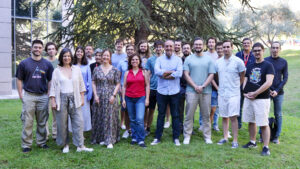


The past decade has witnessed an explosion in the field of “Quantum Materials”, namely materials whose defining behaviour is rooted in the quantum world, with no classical analogue. Quantum materials can be broadly defined as physical systems where the interplay between different degrees of freedom leads to emergent novel ordered phases where quantum mechanics play a pivotal role. Examples of quantum materials that we study include novel correlated electron systems, unconventional superconductors, graphene, two-dimensional van der Waals crystals, topological insulators and topological superconductors.
Two of the most relevant aspects of quantum materials research nowadays are the topological nature of quantum wave functions and the non-local entanglement of quantum states. Both are relevant for applications in quantum computing. Of the many different approaches to the practical implementation of a quantum computer, our activities focus on solid state quantum computing, which holds promise for scalability, long coherence times and compatibility with current technologies. Among the various proposals we give theoretical support to: (1) topological quantum computing, based on Majorana states that arise in different hybrid nanostructured systems and (2) silicon based quantum computing where spin or charge qubits are defined by states confined by selected impurities or quantum dots. Our work is performed in close collaboration with international groups leading state-of-the-art experimental research in this field.
Our research is funded by Ministerio de Ciencia e Innovación, Agencia Estatal de Investigación, FEDER funds, European calls and CSIC. The details can be found here.
